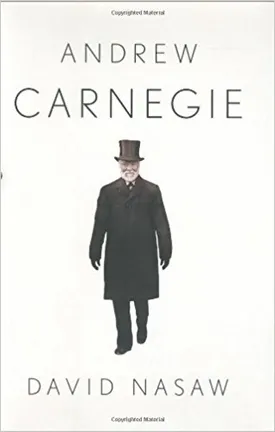David Nasaw
David Nasaw is one of the most celebrated authors and biographers of the modern age. A graduate of Columbia University, the School of Advanced International Studies at the Johns Hopkins University, and the University of Pittsburgh, Nasaw is perhaps best known for his works on American power. These include works such as The Patriarch: The Remarkable Life and Turbulent Times of Joseph P. Kennedy, Andrew Carnegie, The Chief: The Life of William Randolph Hearst, and the US history textbook, The American People: Creating a Nation and a Society.
Born in New York City, Nasaw attended the Hebrew Institute of University Heights, and graduated from Columbia University with both a B.A. and M.A. degrees in history in 1972. He went on to study at the School of Advanced International Studies at the Johns Hopkins University, completing his Ph.D. in American history in 1976. Over the years, he has taught American History at the University of Pittsburgh, the New School for Social Research, and the City University of New York.
As an author, David Nasaw is widely respected for his biographies. His Pulitzer Prize-nominated The Patriarch: The Remarkable Life and Turbulent Times of Joseph P. Kennedy (2012) was widely acclaimed, focusing on the accomplishments and influence of America's most influential political dynasties. The book was called "magisterial" by The New York Times, and was praised as "meticulously researched, often riveting" by The Wall Street Journal. Andrew Carnegie (2006), the work for which Nasaw was rewarded with the 2006 Pulitzer Prize for biography, was also widely praised. His most recent biography of William Randolph Hearst, The Chief (2000), was described as "rich and vivid detail … a narrative that both entertains and informs" by Publishers Weekly.
David Nasaw also emphasizes historically significant events in American history through his work as a lecturer, library research curator and scholar. His work allows him to engage his interest in fringe elements in American history, from the labor movement to the temperance movement, from the early days of the Progressive movement to the rise of a new corporate America. His lectures often draw from his books, and from his years of research into the American political tradition.
Nasaw's wider works include contributions to The American People: Creating a Nation and a Society, Seventh Edition (2009), one of the leading college textbooks on US history. He has also written four collections of essays and historical pieces, such as On the Waterfront: The Pulitzer Prize-Winning Article That Shocked America; Happy Days Are Here Again: The 1932 Democratic Convention, the Emergence of FDR, and How America Was Changed Forever; and Journalism in the Gilded Age (2017). He is also a frequent contributor to The New York Times, The New Yorker and The Atlantic.
Outside of writing, Nasaw has also had an illustrious career as a library curatorial chair and scholar-in-residence. Since 1997, he has held positions at the New School for Social Research, the Harry Ranson Humanities Research Center at the University of Texas at Austin, and the Library of Congress in Washington, D.C.
In sum, David Nasaw is a celebrated and respected author, educator, and researcher. Through his works, readers gain insight into the accomplishments and influence of individuals who have had an indelible impact on American culture and society. In his books and lectures, Nasaw offers readers a window into the lives of some of the most influential people in American history, and the hitherto unknown stories of some of its lesser-known individuals. He is a modern master of biography, history and sociology, and readers of all ages will be fascinated by the richness and depth of his works.

